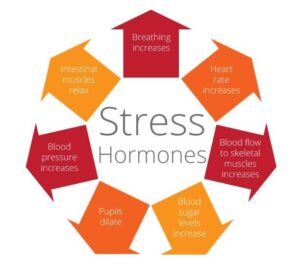Stress is an uncomfortable feeling of tension/discomfort that occurs with an event/situation or a thought, disturbing the physical and mental wellbeing of a person. Chronic or long-term continuous stress is one that we shall be discussing.
What Happens When the Body is Subjected to Continuous Stress?
 There is the release of Cortisol – the stress hormone, whenever the body and mind are subjected to some form of stress regularly and continuously. This stress hormone i.e. Cortisol is normally required by the body in normal quantity as it is responsible for a lot of metabolic functions.
There is the release of Cortisol – the stress hormone, whenever the body and mind are subjected to some form of stress regularly and continuously. This stress hormone i.e. Cortisol is normally required by the body in normal quantity as it is responsible for a lot of metabolic functions.
BUT, when it is secreted in excess as a response to stress, it causes many detrimental effects in the body like high Blood pressure, weight gain and water retention, abnormal blood glucose levels, excess fat storage, etc. and increases the risk of heart problems, stroke, diabetes etc.
How Stress Causes Weight Gain?
The stress hormone, Cortisol leads to weight gain in both men and women, when in excess.
Cortisol and adrenaline are produced by the adrenal gland (small triangular glands situated above the kidneys), which are released into the bloodstream of the body when stress is experienced. Both these hormones are usually produced when faced with a stressful situation, to provide energy that helps a person to either fight it out or run away from the stressful situation. Adrenalin is produced predominantly in acute/short-term situations while cortisol is produced in long-term continuous stressful situations. To put it simply – Constant stress increases the levels of cortisol in the body which stimulates the pancreas to release insulin hormone in the body.
released into the bloodstream of the body when stress is experienced. Both these hormones are usually produced when faced with a stressful situation, to provide energy that helps a person to either fight it out or run away from the stressful situation. Adrenalin is produced predominantly in acute/short-term situations while cortisol is produced in long-term continuous stressful situations. To put it simply – Constant stress increases the levels of cortisol in the body which stimulates the pancreas to release insulin hormone in the body.
Increased insulin levels cause fat storage and a drop in blood sugar levels that make you crave sugary, carbohydrate-rich foods and increase your appetite. So when you are under constant stress, there is an increase in the number of fat cells in the body which get deposited as extra fat resulting in weight gain. Overeating due to an increase in appetite also accumulates extra energy in the body leading to weight gain.
Excess Cortisol also causes Insulin resistance which leads to a vicious cycle ending in abnormal weight gain and abnormal blood sugar levels. Stress can also cause mood changes like depression and anxiety, which may lead to overeating, poor eating habits, and a sedentary lifestyle, resulting in weight gain.

Unhealthy Habits that Can be Developed During Stress
Can Weight Gain Caused by Stress be Managed?
Yes. Weight gain can be managed by using simple and effective ways to control weight and get back to a normal healthy weight. All you need is commitment and a strong desire to stay healthy and happy.
Natural Ways to Manage Stress-Induced Weight Gain
Food intake, a quantity and quality of food and water can help in managing struggling in that process, D WA Herbals research and develops Wellness drinks with the use of natural D WA Herbals CALM Water made from natural extracts of plants and herbs such as Haritaki, keylime, Ashwagandha, tulsi (Indian Basil), and more many herbs with the optimization with the help of technology which can help kick start or boost your weight loss journey and release your stress without any hassle.
© 2023 DWA HERBALS. All Rights Reserved. Designed by NXlogy